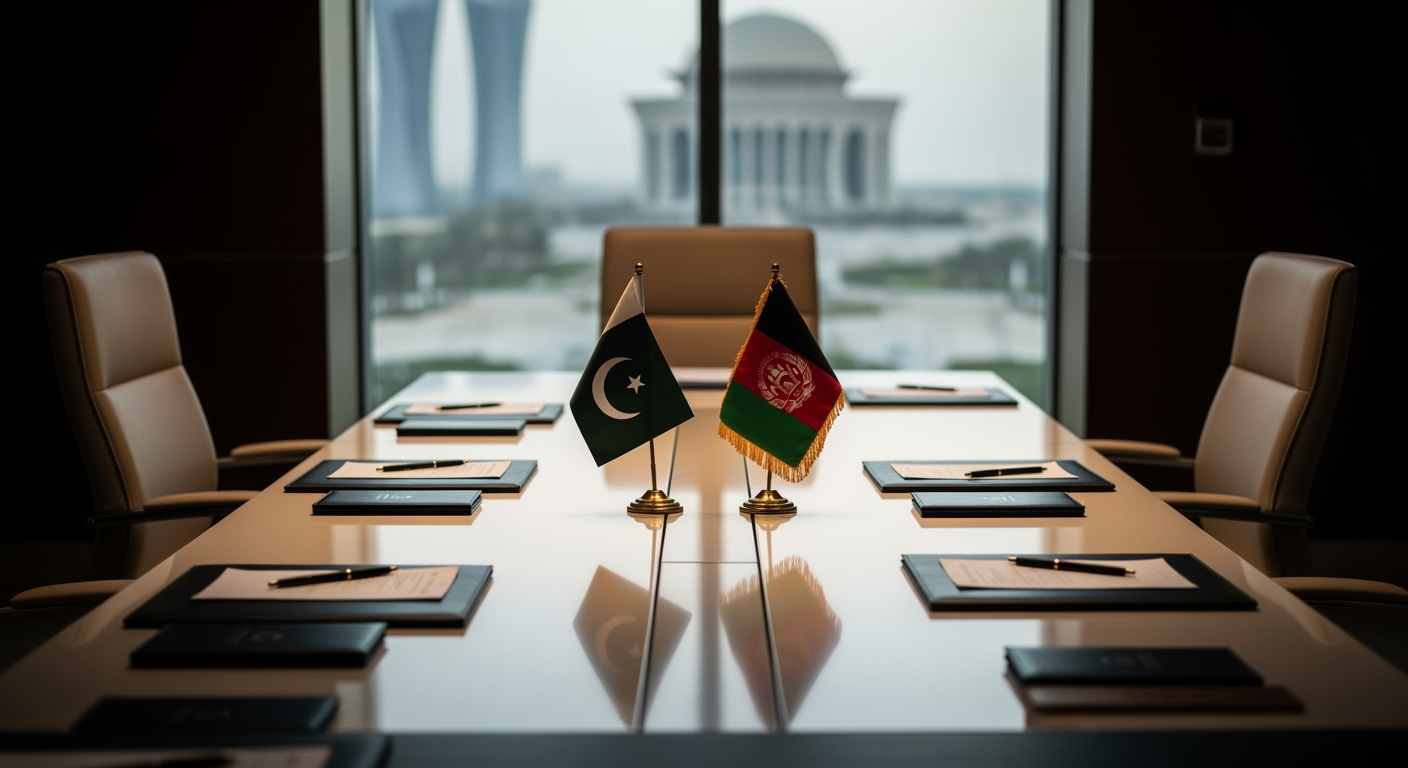Related Articles

Brazil Greenlights Offshore Oil Drilling Near Amazon Mouth Amid Environmental Outcry

Historic White House East Wing Demolition Underway for New Ballroom





DOHA, Qatar – High-level delegations from Afghanistan and Pakistan converged in Qatar's capital, Doha, on Saturday for critical talks aimed at de-escalating a rapidly deteriorating crisis that has seen more than a week of intense cross-border fighting and resulted in dozens of fatalities. The urgent diplomatic push follows a series of deadly incidents, including cross-border airstrikes and militant attacks, pushing relations between the two neighbors to their lowest point in years. The discussions seek to address deep-seated grievances, primarily Pakistan's accusation of Afghanistan harboring militants responsible for attacks on its soil, a charge vehemently denied by the Taliban government in Kabul.
The latest surge in hostilities between Pakistan and Afghanistan has triggered a significant diplomatic intervention, with both nations dispatching senior officials to Doha. Afghanistan’s delegation includes the defense minister, Mullah Muhammad Yaqoob, and the head of its national intelligence agency. Pakistan's contingent is led by Defense Minister Khawaja Asif and intelligence chief General Asim Malik. The talks were arranged following a fragile 48-hour ceasefire, which initially took effect earlier in the week but was reportedly broken by new Pakistani airstrikes hours after its expiry on Friday evening. These strikes, which Pakistani officials indicated targeted militant hideouts, were described by Afghan authorities as having killed at least 10 civilians, including women and children, and three Afghan cricketers.
The recent violence has claimed dozens of lives and left hundreds injured on both sides of the border, making this one of the deadliest periods in bilateral relations in several years. The immediate catalyst for the renewed conflict was a suicide bombing in Pakistan's Khyber Pakhtunkhwa province, which Pakistani officials stated was carried out by the Hafiz Gul Bahadur group, a faction linked to the Tehrik-i-Taliban Pakistan (TTP). This attack prompted retaliatory airstrikes by Pakistan into Afghanistan's eastern Paktika province, targeting alleged militant hideouts. Afghan officials condemned these actions as violations of their sovereignty and attempts to prolong the conflict. The gravity of the situation was underscored by the Afghan national cricket board's decision to boycott an upcoming series in Pakistan following the civilian casualties.
At the heart of the ongoing crisis lies the persistent issue of cross-border terrorism, particularly concerning the Tehrik-i-Taliban Pakistan (TTP), often referred to as the Pakistani Taliban. Islamabad maintains that the TTP, an offshoot and close ally of the Afghan Taliban, has found safe havens in Afghanistan since the Taliban's return to power in 2021. Pakistani officials accuse the Afghan Taliban of failing to rein in these militants, who they claim are responsible for a surge in attacks within Pakistan. Since 2021, Pakistan has experienced a significant increase in militant attacks, with over 2,400 deaths recorded in the first three quarters of 2025 alone, exceeding last year's total. The Pakistani military has lost at least 120 officers and soldiers in militant attacks in the first six months of the year.
Conversely, the Afghan Taliban government denies harboring militants and accuses Pakistan of spreading misinformation and escalating tensions. They insist that the TTP is an internal Pakistani matter and have even mediated talks between the TTP and the Pakistani army in the past. The Taliban government also asserts its right to protect its territory and borders, viewing Pakistan's cross-border operations as violations of its sovereignty.
Adding to the complexity are long-standing disagreements over the Durand Line, the 2,600-kilometer (1,600-mile) border demarcated during the colonial era. Afghanistan has historically refused to recognize this line as an international border, a stance that has fueled animosity and territorial disputes. This historical friction, combined with recent issues such as Pakistan's mass deportation of Afghan nationals, including those with legal refugee status, has further strained relations.
The current downturn in relations marks a stark contrast to the period following the Afghan Taliban's takeover in August 2021. At that time, many Pakistani leaders welcomed the new government in Kabul, believing it would be a friendly regime and a bulwark against security threats. Pakistan had historically supported the Afghan Taliban, even being one of only three UN member states to recognize their previous regime between 1996 and 2001. However, the expectation of a compliant neighbor has been replaced by the reality of an independent, uncooperative Afghan Taliban government.
The relationship between the two countries is steeped in a history of mutual distrust, rancor, and occasional armed clashes dating back to Pakistan's independence in 1947. Afghanistan was the sole country to vote against Pakistan's admission to the United Nations. Despite periods of cooperation, underlying issues like the Durand Line dispute and Afghanistan's persistent resentment over perceived Pakistani attempts to control its affairs have prevented a lasting rapprochement.
The current situation is further complicated by the Afghan Taliban's quest for international recognition, which remains largely elusive. As of July 2025, only Russia has formally recognized the Taliban government, though several other countries, including Pakistan, have upgraded diplomatic relations to an ambassadorial level without formal recognition. The international community, including the United Nations, largely withholds recognition, often linking it to conditions such as the formation of an inclusive government, respect for human rights (especially women's rights), and counter-terrorism assurances.
The Doha talks represent a critical opportunity to pull Pakistan and Afghanistan back from the brink of a wider conflict. The stakes are immense, not only for the two nations but for regional stability. The immediate goal is to reinforce the ceasefire and establish a mechanism for dialogue that can address the core issues of cross-border terrorism and border management. However, the path to a lasting resolution is fraught with significant challenges.
Pakistan's demand for the Afghan Taliban to actively dismantle TTP sanctuaries and prevent cross-border attacks remains a non-negotiable point for Islamabad. The Afghan Taliban, however, faces internal pressures and ideological alignments that make a direct confrontation with the TTP complex. The TTP's resurgence in the borderlands, after being weakened by previous Pakistani offensives, is viewed by Pakistan as an existential threat.
The deeply ingrained historical grievances, coupled with the current trust deficit exacerbated by recent military actions and civilian casualties, underscore the difficulty of achieving a comprehensive and enduring peace. While the talks in Doha offer a glimmer of hope, the fundamental issues driving the conflict, including the disputed border, cross-border terrorism, and the Afghan refugee crisis, will require sustained diplomatic engagement and a willingness from both sides to make difficult concessions to prevent further escalation.